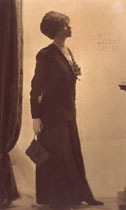|
|
|||||
|
Dear Jerry and Marlene, My compliments on your excellent web site. I'm researching Crowley's activities in America from 1914 to 1919, And think that I may be able to add a few names and some additional information for your list of Friends and Acquaintences.
Among the numerous women mentioned by Crowley in his Magical Record of the Beast, May 31, 1920ev, is the name Belle Green. This is almost certainly Belle da Costa Greene (Fig. 1), J.P. Morgan's librarian. Bonnie Jean Garner describes her thus: "Belle Greene became J.P. Morgan's librarian in 1905, and following his death she became the director of his library, working there for a total of forty-three years. Empowered by J.P. Morgan, and then by his son Jack, Greene spent millions of dollars buying and selling rare manuscripts, books and art. She travelled frequently and lavishly to Europe, staying at the best hotels--Claridge's in London and the Ritz in Paris. It was even said that "on trips abroad, made on Morgan's behalf, she would take along her thoroughbred horse, which she rode in Hyde Park." Belle Greene was described as beautiful, sensual, smart and outspoken. One author writes that "she daringly posed nude for drawings and enjoyed a Bohemian freedom." Never married, she favored affairs with rich or influential men, with a focus on art scholars. Another scholar states, "her role at the Morgan Library placed her at the center of the art trade and her friendship was coveted by every dealer." For many years, Belle Greene wielded an astounding amount of power in the art world and moved comfortably in elite social circles... Belle Greene was a black woman who denied her color to pass herself as white. Evidence indicates that whispers and rumors about her passing circulated around her throughout her life. People like Isabella Gardner, society patron of the arts with close ties to Harvard and a peer of Morgan's, wrote that Belle Greene was a "half-breed" in a private letter (1909) to Bernard Berenson and his wife, Mary, saying, "But first you must both swear secrecy. If not, please do not read anymore of this.".... In order to pass, Greene and her mother decided to change their name. (Actually, you could say that they altered their label.) They added "da Costa," claiming to be part-Portuguese to account for their dusky appearance, a common strategy used for passing. True to the rumors, not only were they black passing for white, but Belle Greene's father was the distinguished lawyer and public figure, Richard Theodore Greener, the first black undergraduate to receive a degree from Harvard." The Morgan Library is located at 29 East 36th Street in New York, just two blocks from Crowley's residence during most of 1915. Belle Greene (and J.P. Morgan, for that matter) were familiar with lawyer and art patron John Quinn, who had befriended Crowley when Crowley arrived in America, and supported him financially by purchasing copies of Crowley's books. As Garner shows, Quinn was able to find some sort of employment for the French futurist Marcel Duchamps, when Duchamps arrived in New York in 1915, by using his influence with Greene, who was acting as paymaster for Morgan. This arrangement with Duchamp did not last long, and seems to have inspired one of Duchamps "readymades", as Garner demonstrates in her essay, "Duchamps Bottles Belle Greene: Just Desserts For His Canning". If I am correct, Quinn did a similar favor for Crowley. Both Quinn and J.P. Morgan were pro-British regarding the war. If Crowley had been sent "on a mission" by some branch of British Intelligence, it is not unlikely that he would receive a warm welcome, and some form of financial backing, as he infiltrated the German propaganda machine in America, passing himself off as a traitor to England. Crowley himself said about this trip, "I had intended, when I left England, to conclude my special business in New York within a fortnight, to make a little splash in any case, and to get home in a month on the outside." In spy jargon, assassination is sometimes referred to as "wet work". That's all for now. Got more if you want it. I'd be very interested in hearing any comments you may have. Thanks, and good health. Steve
|













